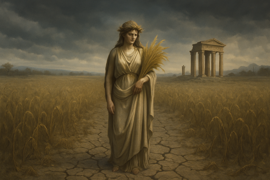Introduction
Long before mortals named the turning of the year or counted the days with polished stones, the fertile earth thrived beneath the gentle command of Demeter, Greek goddess of grain and harvest. Every field was her canvas, every stalk of barley a testimony to her tender guardianship. She moved across meadows like dawn across the sky, coaxing seeds to yawn open and roots to drink deep. Yet nothing on land or Olympus itself shone brighter in Demeter’s eyes than her daughter Persephone, whose laugh rang out like silver bells tossed into the wind. When Persephone roamed among wild irises and pale narcissus, the blossoms seemed to rise on tiptoe, eager for her approving touch.
One radiant morning, the valley below Mount Helicon gleamed with dew-laden petals. Persephone twirled barefoot through grasses still cool from night, weaving garlands of violet, crocus, and shy anemone. Honey-scented breezes fluttered her white linen peplos, and a skylark’s trill stitched joy into the clear blue air. So absorbed was she in the sweet perfume of burgeoning spring that she missed the tremor quivering beneath the loam—an ominous rattle, like distant thunder rolling underfoot. Hades, Lord of the Underworld, had risen in his ebony chariot, his gaze fixed on the maiden’s luminous grace. Unseen fissures zig-zagged beneath the flowers, hungry shadows stretching toward their prize. Fate, silent and watchful, poised to sever the delicate thread binding mother and child.
The Abduction of Persephone
Persephone’s fingertips brushed a cluster of narcissus whose ivory trumpets glowed as though lit from within. The blooms swayed, whispering secrets in the language of petals, but their warning came a heartbeat too late. With a roar like a thousand cedar trunks splintering, the earth cracked wide, revealing a lightless gorge that breathed cold, mineral air. Out surged Hades in a chariot wrought from volcanic glass, its wheels spitting sparks that hissed upon the grass. Four stallions—manes smoky as new-forged iron—reared against the sky, their hooves churning clouds of scentless dust.
The god of the underworld was clad in onyx armour that drank every ray of sunlight. His eyes, fathomless as star-less midnight, latched onto Persephone with a possessive fire that made the valley shudder. She gasped, the wreath slipping from her hands, petals scattering like frightened doves. Before her cry could reach Olympus, Hades clasped her wrist—his touch colder than mountain snowmelt—pulling her into the shadowed carriage. The horses lunged forward; the chasm slammed shut behind them, sealing the girl away from the living world.
All fell silent save for the lonely echo of departing thunder. Persephone’s crown of lilies lay abandoned, bruised petals staining the grass like drops of milk and wine. Overhead, the sky dimmed as though the sun itself mourned. Nearby nymphs fled, beating their wings in frantic disarray, but none could pierce the solid mantle now separating Persephone from sunlight. The valley’s once-joyous blooms wilted, their stems bending in grief, and the sweet wind that had flirted with her hair died to a stagnant hush. In that instant—when innocence met oblivion—the first shadow of winter was cast upon the world.

Demeter’s Lament and the Withering Earth
News of Persephone’s vanishing swept over Olympus like a tempest. When Demeter learned of her child’s fate, her wail split the cloud-wreathed halls, rattling ambrosial goblets and stilling divine laughter. She tore emerald-studded bracelets from her wrists, letting them fall like hailstones upon marble steps, and cast aside her golden fillet so it clanged like a funeral bell. Refusing nectar or counsel, she donned a coarse traveller’s cloak and descended to earth, her once-radiant face shadowed by despair.
Across Thracian plains and Attic hills she wandered, searching each grove and brook with feverish eyes. Where her sandals touched, grass frosted; where her tears fell, ponds glazed over in brittle glass. Farmers watched in horror as wheat heads shrivelled, barley ears emptied to chaff, and green orchards turned skeletal overnight. The smell of parched soil rose like smoke, drifting through villages now haunted by hollow-cheeked children. Livestock mooed feebly at dry troughs, their ribs jutting like harp strings that played only dirges.
Temple altars, once heaped with honey-cakes and ripe figs, stood bare beneath cobwebbed lintels. Panicked priests entreated Demeter, but she passed them by, eyes unfocused, lips moving in ceaseless questions: *Where is my child?* The sun blazed hotter, yet its fire could not thaw her grief—fields cracked, rivers snarled into muddy threads, and the very air tasted of chalk and ash. Mortals lifted hands to heaven, but thunderheads of mercy remained out of reach. Even Zeus, attuned to every mortal prayer riding thermal currents skyward, felt the weight of their suffering settle like lead upon his brows.

The Reunion and the Birth of Seasons
Finally, Olympus itself groaned beneath the burden of famine. Zeus, guardian of cosmic order, summoned Hermes, fleet-footed herald, to negotiate Persephone’s release. Swifter than echo, Hermes plunged into the stony corridors of Tartarus, his winged sandals sparking light in those tortured caverns. He found Persephone seated beside a pool of obsidian, her reflection a pale ghost floating atop black water. At his plea, Hades emerged from shadowed arches draped in silent ivy. With measured words he spoke of unyielding love, claiming his dark realm had grown warm beneath her smile.
Zeus decreed that Persephone must rise again, yet destiny hid a thorn. Hades extended a ruby-flecked pomegranate—fruit of the underworld—whose seeds glowed like embers. Unaware of its binding power, Persephone tasted six jewel-bright arils, their tart nectar staining her lips. When Demeter and her daughter were reunited upon a sun-washed plain, their embrace sparked an explosion of bloom: crocuses burst through crusted earth, almond trees blushed pink, and skylarks spiralled heavenward in ecstatic arias.
Still, divine law held sway. For each pomegranate seed consumed, Persephone must spend one month with Hades. Six seeds, six descending moons. In spring and summer she would dwell with Demeter, her footsteps coaxing every seedling from slumber; in autumn and winter she would reign as queen below, bringing quiet rest to roots and souls alike. Lightning forked across the horizon as Zeus sealed the covenant, a jagged signature in the firmament. Demeter accepted with heavy grace, vowing to shower the earth with bounty whenever Persephone returned—and to mourn in frost-laden silence whenever she departed.

Conclusion
And so the mortal world learned to breathe in rhythm with a mother’s heart. When Persephone ascends each March, she scatters colour across valleys like a painter flinging vibrant pigments on canvas. Spring unfurls in emerald bursts; summer ripens wheat into golden seas that sway under cobalt skies. But as the sixth month wanes, the call of the underworld reverberates like distant drums. Autumn tugs Persephone back, painting vineyards crimson and orchards amber before surrendering her to shadow. Winter follows—a hush of silver frost and contemplative night—until the cycle spins anew.
This enduring Greek myth reminds us that grief and joy are twin vines winding around the same trellis. Just as Demeter’s sorrow makes room for rebirth, our darkest seasons can cultivate unseen seeds of hope. With each budding crocus and every fall of snow, the tale whispers that endings are merely thresholds, and love—be it divine or human—has the power to tilt the axis of the world. Through harvest festivals and winter solstice fires, the *Legend of Demeter and Persephone* continues to nourish hearts, teaching that even in loss, the promise of reunion waits beyond the horizon.

















